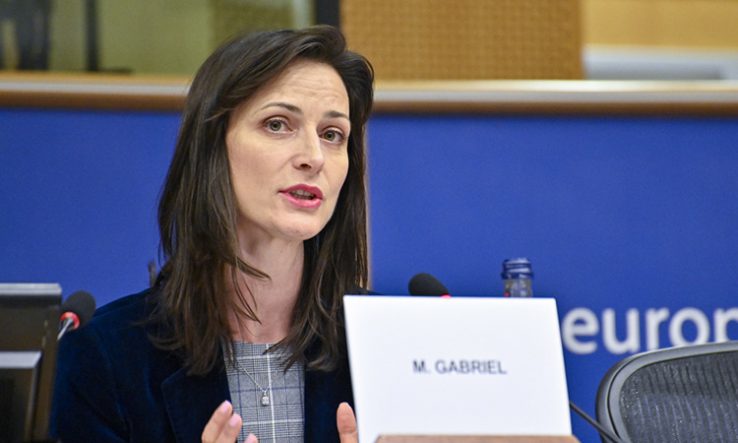
Image: Sebastien Pirlet, European Union 2020
Commission promises ‘increased firepower’ from revamped EU budget proposal
The European Commission is working on an investment plan to fuel the EU’s recovery from the Covid-19 pandemic, which Commission president Ursula von der Leyen has said must increase the “firepower” of the bloc’s 2021-27 budget, and R&D commissioner Mariya Gabriel has said must prioritise investment in R&D.
“Research and innovation should be key and will be key to ensure a sustainable and inclusive recovery”, Gabriel (pictured) told the European Parliament’s research committee on 24 April, the day after national leaders formally asked the Commission to create the investment plan.
“Public investment in research and innovation should be prioritised,” Gabriel added. “I think the current crisis has demonstrated how essential research is when it comes to ensuring that we are reactive and can tackle this kind of unprecedented crisis.”
Gabriel herself will have limited power to influence a revised budget proposal, which will be put forward by the Commission for negotiation by member state leaders. There has been concern in academia that a roadmap for recovery discussed by leaders in a teleconference on 23 April does not mention research or education, but Gabriel told the committee she thought the leaders’ discussions delivered a “step in a good direction”.
von der Leyen said after the teleconference that the firepower of the EU budget would be boosted by increasing the amount the EU is able to raise through taxes and other levies from 1.2 per cent of the bloc’s gross national income to 2 per cent. Gabriel told the committee: “Now it’s up to all of us to continue to show that research and innovation are key components in the ‘Marshall Plan’ for Europe’s recovery.”
Asked whether a previously proposed budget of €83.5 billion in 2018 prices for the 2021-27 R&D programme Horizon Europe would be sufficient, Gabriel said: “We will need more means, more funds for research and development, and I will remain mobilised.”
“Following the Council meeting yesterday I believe that there is an overture so that we can speak about this in the course of the upcoming two weeks when the member states come to an agreement on what type of mechanisms will be used—grants, guarantees—to see what we can do and of course to focus on the importance of the budget that we will need for research,” she said.
“There’s no way that we will be able to have a long-term recovery without treatment and vaccination, and research will be needed for these two things and we need to also upscale for the next crisis.”
Gabriel insisted no money would be taken away from the Horizon Europe programme to tackle the pandemic. But she said there was “widespread frustration among many Europeans that the EU is not doing enough to tackle the crisis”, and that the bloc needed to better promote the “incredible effort made by our European research and innovation ecosystem”.
She said she did not think the already-agreed structure of Horizon Europe should change much, but that there was some flexibility available. She said planned public-public and public-private R&D partnerships would contribute to the recovery, and that her team was “looking directly at whether we need or should have an additional European partnership on pandemic preparedness and societal resilience”.
Gabriel said Europe was “amongst the frontrunners” in the development of vaccine candidates for Covid-19, but warned, “It’s going to be crucial to continue to support [companies developing vaccines] when we get to about August or September when we shift from the phase of having a vaccine [to] how we’re going to produce it”.
Her comments came as the European Investment Bank formally approved a €75 million investment in the German vaccine company CureVac. The European pharmaceutical trade body EFPIA said on 23 April that the EU budget would be “a key instrument in supporting Europe’s research eco-system as part of the economic recovery” and that an upcoming EU pharmaceutical strategy should address this.
Despite the significant sums that could be made available through the EU budget, Thomas Estermann, director for governance, funding and public policy at the European University Association, warned in a briefing published on 23 April that EU funds “cannot and should not compensate for budget cuts at country level” in terms of public financing for universities in the aftermath of the pandemic.